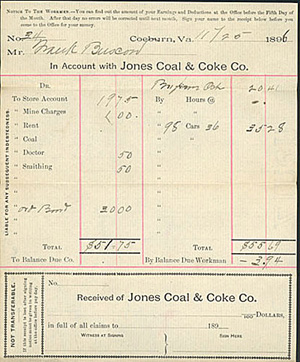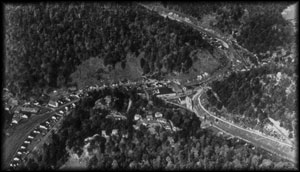 Frank Bascom in Account with Jones Coal &
Coke Co., Coeburn, Wise County. Printed form and manuscript. Wise County
Circuit Court Records.
Frank Bascom in Account with Jones Coal &
Coke Co., Coeburn, Wise County. Printed form and manuscript. Wise County
Circuit Court Records.The Library of Virginia.
 Dante in Russell County is the center of the coal
industry. 1939. World's Fair Photographic Collection. The Library of Virginia.
Dante in Russell County is the center of the coal
industry. 1939. World's Fair Photographic Collection. The Library of Virginia.
The earliest coal camps often consisted of boarding houses for the mostly unmarried male miners; duplexes and single-family houses were more common after the 1910s when companies actively recruited a more stable workforce of married men with families. Squeezed between mountains and stretched out along creeks, the camps often were divided along class, ethnic, and racial lines. Mining town sections carried names such as "Pink Town" (native white), Colored Hill" (African American), Hunk Town" (Eastern European), and Quality Hill" (company officials). Even after the establishment of permanent housing, coal towns often lacked adequate sewerage and water facilities.
Naming a coal town was the prerogative of the operator. Stonega Coke & Coal Company named its first coal camp, established in 1896, Stonega, a combination of Stone and Gap. Camps were named for people (Imdoben, 1910) or for villages in Great Britain (Dunbar, 1917). Whimsy occasionally surfaced; according to local tradition the coal town of Derby, founded in 1923, was named by its Philadelphia company officials who traveled through the area on their way to the Kentucky Derby. The origin of Keokee, in Lee County, built in 1910, is a mystery; it may be a Cherokee word or the name of the wife of one of the company officials.

